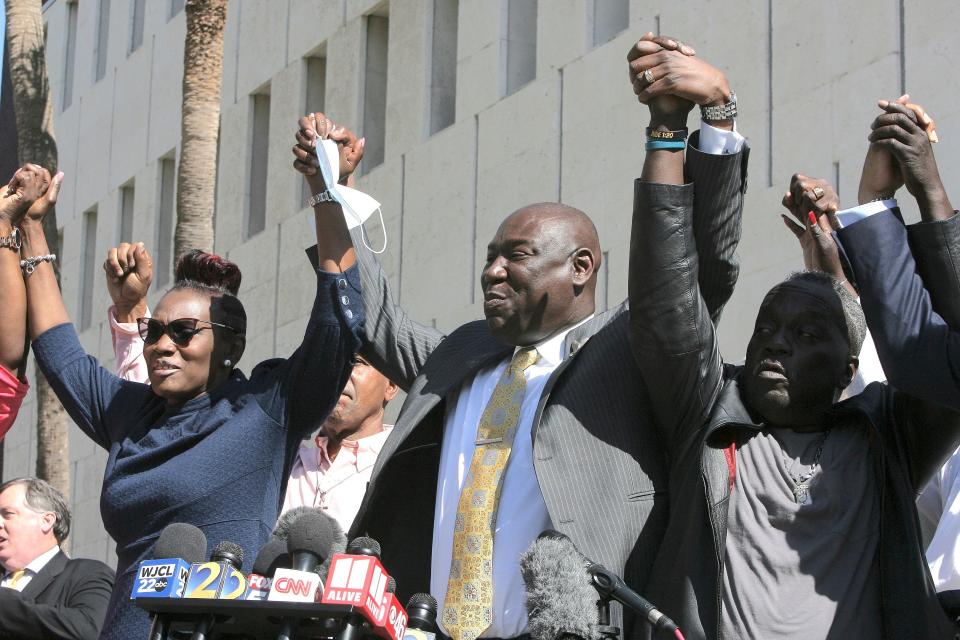What the hate crime verdicts in Ahmaud Arbery's death say about justice and race in America
The sentencing of three white Georgia men convicted of murdering Ahmaud Arbery marks the conclusion of a federal hate crimes case that legal experts say finally acknowledged the racist motivations of what many called a modern-day lynching.
A jury in February found father and son Gregory and Travis McMichael and their neighbor William "Roddie" Bryan guilty of hate crimes and attempted kidnapping in the murder of Arbery nearly two years before. The three men were already serving life in prison on state convictions.
Legal experts told USA TODAY the outcome of the second trial marked a historic moment in Georgia and indicated the Justice Department's increasingly active role in prosecuting crimes motivated by hate. Others noted Arbery's family's role in putting pressure on federal prosecutors to ensure the case went to trial.
"The first trial was whitewashed. It took race out of the situation, and that was a real harm," said Justin Hansford, executive director of the Thurgood Marshall Civil Rights Center at Howard University. "It meant a lot to have this second verdict that expressed a particular acknowledgement of the fact that this was a hate crime and punishing it as such."
On Monday, Gregory and Travis McMichael, 66 and 36, were again sentenced to life in prison on that second conviction. Bryan, 52, was sentenced to 35 years in prison.
"The length of the punishment is notable, but more important to me was the federal prosecutors ensuring that this goes down as part of the legacy of white supremacy in the United States, not just some type of interpersonal disagreement that went wrong," Hansford said.LATEST: Travis McMichael sentenced to life in prison on hate crime charges in murder

Fewer than 1 in 5 suspects of federal hate crime-related cases are prosecuted, according to Justice Department statistics, which undercount hate crimes because few jurisdictions report the data. Most cases are settled, said Brian Levin, director of the Center for the Study of Hate and Extremism at California State University, San Bernardino.
Prosecutors with the Justice Department initially struck plea deals for the McMichaels – against the wishes of the family. A judge rejected the deals, and the trial moved forward.
"What we got today, we wouldn't have gotten today if it wasn't for the fight the family put up," Arbery's mother, Wanda Cooper-Jones, said at the time. "We got a victory today, but there are so many families who don't get victories."
On Monday, Cooper-Jones said: "I'm very proud to say that we finally got justice for Ahmaud on the federal level."
The convictions should reinforce to families that they are right to advocate for prosecution, said Hansford, a professor at Howard University School of Law.
"It would have been certainly a mistake or really just selling the family short to have gone the plea deal route," he said. "The family was right to stand up and express the importance of the actual trial."
MORE: Finding my family's history in Brunswick, Georgia, where Ahmaud Arbery was murdered

The case signifies a renewed willingness of the Justice Department to "carry out the original purpose of its charge – to protect the rights of Black people facing racist violence and discrimination in the years following the Civil War," said Ayesha Bell Hardaway, an associate professor at Case Western Reserve University School of Law and co-director of the school's Social Justice Institute.
"None of this will heal the pain of the Arbery family. And none of it will remove the terror felt by Black men, women and children who are targeted because of the color of their skin. But this case can serve as notice to those who espouse white supremacist views that there is no safe harbor in the federal system for those who act on their racist views," she said.
In a news conference after the verdict earlier this year, Attorney General Merrick Garland said the agency will continue to confront acts of hate and hold perpetrators accountable. Hate crimes "have a singular impact because of the terror and fear that they inflict on entire communities," he said.

At the same time, it's important to note the Justice Department typically goes after cases only if it can win, as shown by its high conviction rate, Bell Hardaway said.
"Over the course of our history, working diligently to enforce those protections and those rights hasn't always been a priority or hasn't been perceived as the politically expedient thing to do," Bell Hardaway said of the department.
'We want 100% justice': Judge rejects plea deal with man who killed Ahmaud Arbery
Several experts said the verdict is a watershed moment for the U.S. South. Georgia attorney Page Pate said it was "hard to overemphasize the significance" of the federal hate crimes convictions.
"We had a mostly rural south Georgia jury deliberate for less than half a day in a three-defendant, multiple-count indictment, return across-the-board guilty verdicts and elect as their foreperson the only Black male on the jury to deliver the verdict," he said.
Pate, who has an office across from the courthouse in Brunswick, said his community made a "180-degree turn" in two years, from a district attorney's office that attempted to sweep the case under the rug to a new district attorney, a new police chief and convictions in state and federal court.
"Even though I'm sitting in the same place I was two years ago when this happened, everything around me is different," he said at the time.
Activist Al Sharpton called the outcome a "precedent setting verdict" for the region. "Even in the Deep South the feds will convict you of hate actions. I salute Ahmaud’s parents for forcing the trial," Sharpton wrote on Twitter at the time.
MORE: Ex-prosecutor shielded men who killed, charges allege

Levin noted the trial took place "in the same area of the country that initially refused to convict in federal court Klan and other racist defendants."
"This trial at this time in federal court is an important, symbolic and historic verdict because it's showing that the South can vindicate not only victims but also the community of people who are still repulsed by this kind of modern-day lynching," Levin said.
Before Arbery's death, Georgia was one of a handful of states without hate crimes legislation. Weeks after the killing, Georgia passed a hate crime law and repealed its citizen's arrest statute.
The state law imposes additional penalties for crimes motivated by a victim's race, color, religion, national origin, sex, sexual orientation, gender or disability, and it mandates data collection on hate crime incidents.
Margaret Huang, CEO of the Southern Poverty Law Center, said the convictions were an important step by the criminal justice system in addressing pervasive inequities in the treatment of Black and brown people. But she noted there isn't always video documentation of a crime, as there was in this case.
"The fact that justice was done in this case does not deny the reality that countless Black men are targeted and killed for no reason other than the color of their skin," Huang said.
Though the Justice Department welcomed the verdict, Garland said, "the only acceptable outcome in this manner would have been Mr. Arbery returning safely to his loved ones two years ago."
"His family and his friends should be preparing to celebrate his 28th birthday later this spring, not mourning the second anniversary of his death tomorrow," Garland said at the time.
This article originally appeared on USA TODAY: Ahmaud Arbery historic hate crime verdict: What it means for justice

 Yahoo Movies
Yahoo Movies 